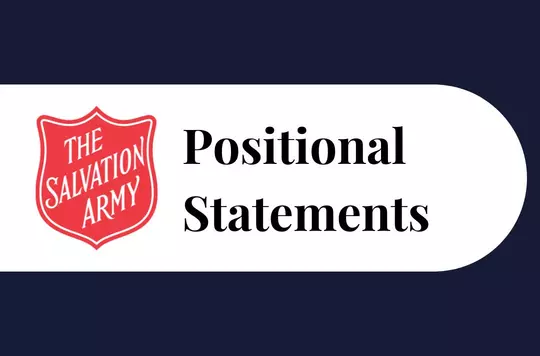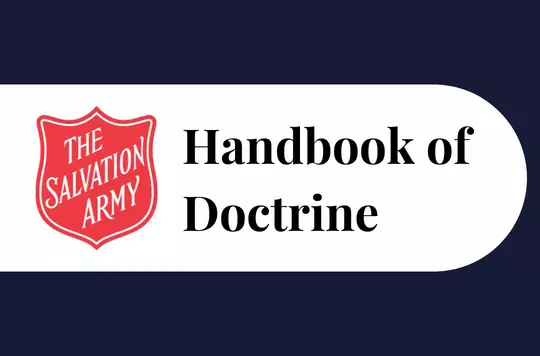4 November 2024
A question of life and death
Lieut-Colonel Nick Coke

Lieut-Colonel Nick Coke considers the risks of the assisted suicide Bill being debated in parliament.
On 29 November the House of Commons will debate and vote on a second hearing of the Terminally Ill Adults (End of Life) Bill. This private members’ Bill proposes to allow adults who are terminally ill, subject to safeguards and protections, to request and be provided with assistance to end their own lives. It raises serious questions for society and for us as Christians.
We believe that ‘God created humanity in God’s own image’ (Genesis 1:27 Common English Bible), that life is a precious gift from God. Even unintentionally, this legislation challenges that value by inviting people to question when a life can be deemed no longer worth living.
The Salvation Army in the UK and Ireland opposes assisted suicide, a stance that is outlined in a positional statement published in 2015. This opposition is rooted not only in the value of life, but also in a genuine concern for the potential consequences of legalising assisted suicide.
If the law says it is OK to assist suicide, it risks suggesting that people should consider suicide as a legitimate option. The Bill promises safeguards to protect from possible coercion, but it cannot legislate for the complexities of life. Social factors, overstretched medical practitioners and even loved ones can unintentionally lead someone to feel like a burden, and therefore feel pressured into ending their life.
In our unfair and unjust society, access to quality end-of-life care often depends on charitable donations or personal wealth. People living in poverty are less likely to have access to the help they need to relieve pain at the end of their lives. Under these circumstances, they might also feel it is better to die than to live.
Vulnerable people are at the heart of The Salvation Army’s mission. Our territory’s value of compassion calls us all to serve others with a bias to the poor and marginalised. That is why the Army in this territory is campaigning against the Bill: to protect vulnerable people, particularly people with disabilities or serious mental health conditions, from feeling pressured to end their lives as the only way to alleviate pain. The Army is also campaigning for the government to secure consistent funding for palliative care that is accessible to all.
This is not a simple issue and people’s personal views will be shaped by their own experiences. The Army’s positional statements provide guidance to members, but it is understood that individuals may have different views and the Army does not condemn anyone who does.
At the heart of this is the complex question of suffering. No one wants their loved ones to suffer, and the reality of suffering can challenge our faith in an all-powerful God of love. And yet, as our Handbook of Doctrine observes, Christians ‘are not saved from suffering, but saved in suffering and sustained by the fact that Christ suffers with them’.
As we navigate the modern world and its moral dilemmas, we can love God and love others by leaning into these difficult conversations with humility. Philippians 2:5 reminds us to ‘have the same mindset as Christ Jesus’ in our relationships with one another.
Whatever your personal view is, let’s remember our Movement’s bias to vulnerable and marginalised people, let’s build safe spaces where we can respectfully explore big issues together, and let’s recognise each life as made by a loving God.
Reflect and respond
- Read the territory’s full positional statement – see below.
- Reflect on pages 43 to 50 of the Handbook of Doctrine – see below.
- Pray for people with terminal illnesses, loved ones who are grieving, people working in palliative care and anyone who feels like they are a burden on others.
- Pray for God’s guidance for politicians debating the Bill and for our response as Christians. If you want to add your voice to the Army’s campaign, you can write to your MP.
Written by

Lieut-Colonel Nick Coke
Secretary for Communications, THQ

UKI Euthanasia, Assisted Suicide and Living Wills Positional Statement
The Salvation Army in the United Kingdom and Ireland's positional statement.

The Salvation Army Handbook of Doctrine
Explore the 11 biblically based Salvation Army articles of Christian faith.
Discover more

The Salvation Army is calling on the UK government to oppose assisted suicide and protect vulnerable people.

A pastoral letter from Territorial Leaders Commissioners Jenine and Paul Main on the topic of assisted suicide.

Helping Salvationists engage in moral and social issues in their communities.

We speak into areas of public policy to support change for the benefit of some of the most disadvantaged people in our communities.